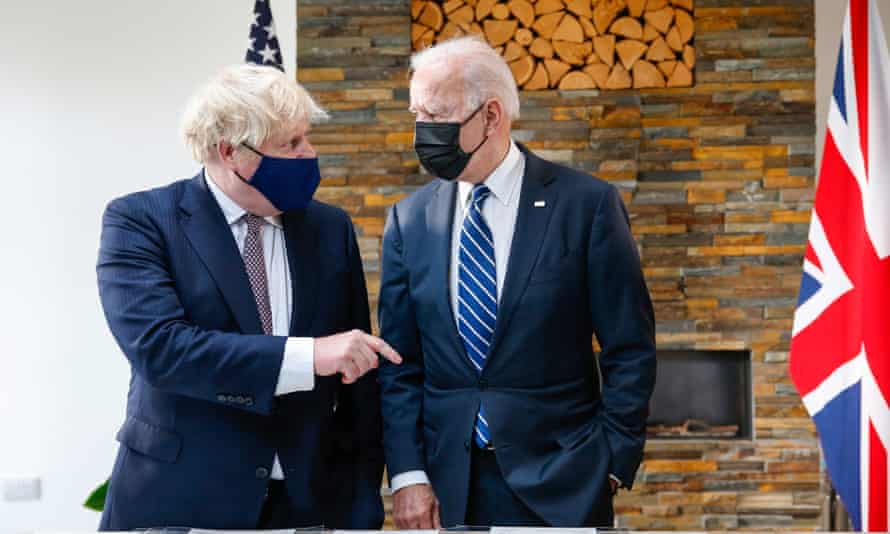Analysis: Mundane conflicts over sausage exports have no place in high-flown plans for new Atlantic charter

Whatever precise pressure US diplomats put on Boris Johnson’s Brexit negotiator, Lord Frost, ahead of Joe Biden’s rather chaotic first photocallwith Johnson at the G7 summit at Carbis bay, both sides were keen at their bilateral meeting to put the ugly genie back in the bottle.
The US side claimed there was nothing it had been saying to the British in private about the sanctity of the Good Friday agreement that it had not said in public, adding there had been no presidential directive to the US embassy to heighten the issue via a demarche to Frost, a florid piece of diplomatic jargon of French origin normally reserved for something akin to Russian diplomats caught spying.
For his part Johnson, as the architect of the Northern Ireland protocol that he once hailed, used to dislodge Theresa May and now disowns, looked a little sheepish.
Both men, after all, had a grand agenda ahead of them, covering democracy’s defence, the climate crisis and the Covid pandemic, and were planning to compare themselves with the war leaders Winston Churchill and Franklin D Roosevelt by agreeing a contemporary version of the historic 80-year-old Atlantic charter, a modern route map for post-Covid times.
The intended signal was that the UK and the US, with their shared history of sacrifice, had a special role in stewarding the world out of a crisis that justifiably bears comparison with the second world war, if not in length then in terms of loss of life.
In this context, mundane conflicts about the terms on which British pork farmers could export sausages to Northern Ireland had a bathetic quality. True, there are deep principles at stake: sovereignty, the sanctity of international law and the integrity of the UK. But the granular detail with which these issues are contested by Brussels and London hardly fight themselves into the opening clauses of a new, high-flown Atlantic charter.
Nevertheless, the fact that the issue exploded on to the pre-G7 agenda is yet another reminder that Biden takes his Irish Catholic roots seriously, and as the former UK ambassador to Washington Sir Peter Westmacott advised: “This is a serious issue for this administration that cannot be brushed aside, or parked, and not discussed. The president knows this subject backwards.” Simon Coveney, the Irish foreign minister, also thought Biden grasped this issue. He said: “I think he has a capacity to see through the spin and the fog and the articles in the British media about the protocol and simplifies the message: a deal was agreed, for good reason. Now it needs to be implemented.
Team Europe – Charles Michel and Ursula von der Leyen – will be in Cornwall, along with Angela Merkel and Emmanuel Macron, so the issue can now hardly be avoided. Macron in particular, with an election to win next year, is determined to call out Johnson’s double-dealing. With the US president on hand over the weekend, Johnson may even feel a trifle encircled on his home turf. At the least, he may have to give more than generalised assurances about his future conduct in these talks.
Johnson’s conduct has a wider context. Biden’s great argument throughout his visit to Europe is that a revived democratic alliance has to equip itself for an existential competition with China’s authoritarianism, describing this as the great battle of this century.
He regards the strength, variety and depth of those alliances as the shield of the republic, the way in which the democracies can defeat China, a country that by contrast has been unable to build such a network of friends. Indeed, the revamped Atlantic charter published on Thursday night without mentioning China promises to “defend the principles, values, and institutions of democracy and open societies”. It vows: “We must ensure that democracies – starting with our own – can deliver on solving the critical challenges of our time.” Biden is determined his democratic allies do not embark on this titanic struggle by falling out with one another.
But any suspicion that Johnson is more intent on disrupting the EU and impishly play to a domestic gallery will infuriate Washington. It will also be a million miles from Johnson’s claim in the Times on Thursday that Britain is the “buckle that fastens, the hyphen that joins everything together”.
